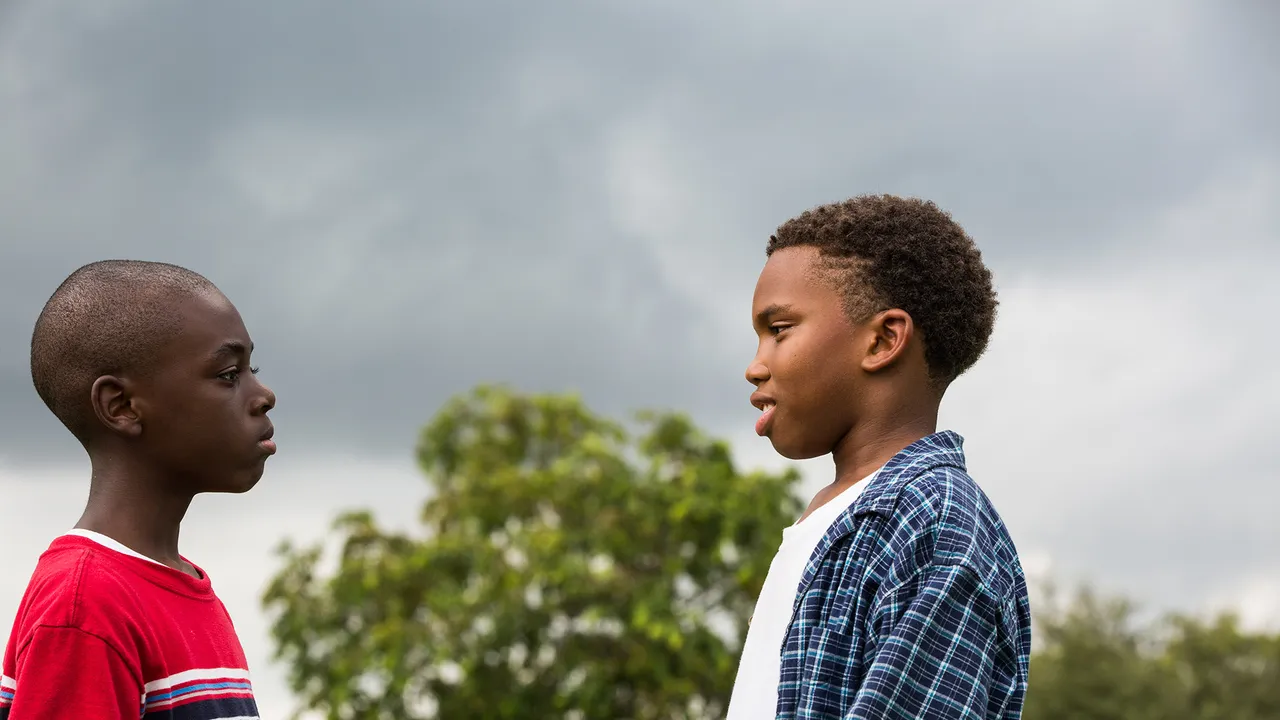“Moonlight” is a 2016 coming-of-age drama film directed by Barry Jenkins. The movie tells the story of a young Black man named Chiron growing up in a rough neighborhood in Miami, Florida. The film is divided into three chapters that follow Chiron’s life from childhood to adulthood, as he grapples with his identity, sexuality, and relationships with his mother, friends, and a father figure. “Moonlight” explores themes of race, class, masculinity, and vulnerability, and has received critical acclaim for its nuanced portrayal of a Black queer protagonist and its cinematic artistry.
Exploring identity and belonging is crucial to understanding the central themes and character development in “Moonlight”. The protagonist, Chiron, grapples with questions of who he is and where he belongs throughout the film, and these struggles are intertwined with his experiences of race, class, and sexuality. Through examining Chiron’s journey, we can gain insights into the complexity of identity formation, the impact of societal norms and expectations, and the importance of community and connection. Additionally, the film’s exploration of these themes sheds light on the experiences of marginalized individuals and the ways in which they navigate a world that often excludes or ostracizes them. Overall, exploring identity and belonging in “Moonlight” can deepen our empathy and understanding of diverse experiences, while also highlighting the universal human need for acceptance and belonging.

Background on the movie
“Moonlight” was directed by Barry Jenkins, who also co-wrote the screenplay with Tarell Alvin McCraney. The film is based on McCraney’s unpublished semi-autobiographical play “In Moonlight Black Boys Look Blue.” Jenkins and McCraney grew up in the same Liberty City neighborhood in Miami, and both drew from their own experiences to create the story of “Moonlight.”
The cast of “Moonlight” includes a talented ensemble of actors, many of whom were relatively unknown at the time of the film’s release. Alex R. Hibbert portrays young Chiron, Ashton Sanders plays teenage Chiron, and Trevante Rhodes portrays adult Chiron. The supporting cast includes Mahershala Ali, Naomie Harris, Janelle Monáe, and André Holland, among others. The actors deliver powerful and nuanced performances that bring the characters to life with authenticity and depth.
“Moonlight” has received widespread critical acclaim since its release in 2016. The film has been praised for its direction, writing, cinematography, and performances, with many critics hailing it as a groundbreaking work of art. The film won several major awards, including the Golden Globe for Best Motion Picture – Drama and the Academy Award for Best Picture. It also won Best Supporting Actor for Mahershala Ali, and Best Adapted Screenplay for Jenkins and McCraney.
Critics have noted the importance of “Moonlight” in the representation of Black queer experiences on screen, as well as its exploration of broader themes of identity, community, and belonging. The film has been hailed as a masterpiece of contemporary cinema and a cultural touchstone for the LGBTQ+ and Black communities. Overall, “Moonlight” has been widely celebrated for its artistry, innovation, and emotional depth, and its impact on the film industry and broader culture continues to resonate.

Identity in “Moonlight”
Chiron’s struggle with identity is a central theme of “Moonlight.” As a young Black boy growing up in a rough Miami neighborhood, Chiron is acutely aware of his difference from others. He is quiet, sensitive, and struggles to fit in with the other boys. Throughout the film, Chiron grapples with questions of who he is and where he belongs. He is bullied and called derogatory names, and he struggles to connect with his drug-addicted mother, Paula. Chiron is also grappling with his emerging sexuality, which adds another layer of complexity to his sense of self.
The film explores the intersectionality of race, class, and sexuality through Chiron’s experiences. As a Black, working-class, queer man, Chiron navigates a world that often excludes or marginalizes him. His identity is shaped by the intersections of these different aspects of his life, and the film portrays how these factors influence the ways in which he is perceived and treated by others. For example, his classmates taunt him with homophobic slurs, his mother struggles with addiction and poverty, and he is forced to navigate the pressures of hypermasculinity and street violence.
Throughout the film, other characters perceive and influence Chiron’s identity in different ways. For example, Juan, a drug dealer who becomes a father figure to Chiron, encourages him to embrace his sensitivity and vulnerability, telling him that “it’s okay to cry.” On the other hand, Terrel, one of Chiron’s classmates, bullies him and calls him homophobic slurs, reinforcing the notion that being gay is shameful or wrong. Chiron’s mother, Paula, struggles with her own addiction and often neglects or mistreats Chiron, contributing to his sense of isolation and loneliness.
“Moonlight” portrays the complex and intersectional nature of identity formation, highlighting the ways in which societal norms, relationships, and personal experiences shape who we are and how we see ourselves. The film’s nuanced portrayal of the protagonist’s struggle with identity adds depth and complexity to its exploration of broader themes of race, class, and sexuality.

Belonging in “Moonlight”
“Moonlight” explores themes of isolation and community through the protagonist’s journey. Chiron often feels alone and disconnected from others, struggling to find a sense of belonging in a world that is hostile to his identity. However, he also experiences moments of connection and community with others who share his struggles. Through his relationships with mentors, friends, and lovers, Chiron learns to navigate his isolation and find moments of acceptance and belonging.
Family, friends, and mentors play a crucial role in Chiron’s sense of identity and belonging. Juan serves as a mentor and father figure, providing guidance and support to Chiron during a critical time in his life. Kevin, a childhood friend and love interest, represents a connection to Chiron’s past and offers a glimmer of hope for his future. The role of Chiron’s biological mother, Paula, is complex, as she both contributes to his feelings of isolation and also provides a connection to his past and cultural heritage.
“Moonlight” also explores how environment and social context affect the protagonist’s sense of belonging. Chiron’s experiences are shaped by his environment, as he navigates the challenges of poverty, violence, and prejudice in his Miami neighborhood. His sense of belonging is also influenced by the social context of his identity as a Black, working-class, queer man, which places him outside the mainstream of society. Through exploring these factors, the film highlights the ways in which social structures and cultural norms can impact our sense of self and belonging.
“Moonlight” offers a nuanced exploration of the themes of isolation and community, and the role of family, friends, and mentors in shaping our sense of identity and belonging. The film highlights the importance of empathy, understanding, and connection in navigating the challenges of isolation, and the ways in which our environment and social context can impact our sense of self and place in the world.

Intersection of identity and belonging
Chiron’s identity shapes his sense of belonging in profound ways. As a young, queer Black man growing up in a rough Miami neighborhood, he is acutely aware of his difference from those around him. He struggles to fit in with his peers, and his emerging sexuality only adds another layer of complexity to his sense of self. Throughout the film, Chiron grapples with questions of who he is and where he belongs, and his identity plays a critical role in shaping his understanding of his place in the world.
Chiron’s sense of belonging also informs his identity. As he navigates the challenges of isolation and marginalization, he seeks out connections with others who share his struggles. Through his relationships with Juan, Kevin, and even his mother, he finds moments of acceptance and community that help shape his understanding of who he is and where he belongs. His sense of belonging is also influenced by his environment, as he navigates the challenges of poverty, violence, and prejudice in his neighborhood.
There are several examples from “Moonlight” that illustrate the intersection between Chiron’s identity and his sense of belonging. For example, in the first chapter of the film, Chiron is chased by a group of boys who call him homophobic slurs. He hides out in an abandoned apartment, where Juan finds him and offers him guidance and support. Through his relationship with Juan, Chiron begins to understand that his sensitivity and vulnerability are not weaknesses, but strengths that he can embrace.
Later in the film, Chiron reconnects with Kevin, a childhood friend and love interest. Their reunion is fraught with tension, as Chiron is still grappling with the trauma of his past and the challenges of his present. However, through their conversation, Chiron is able to confront some of his fears and anxieties, and begins to see himself in a new light. Their connection offers a glimpse of hope for Chiron’s future, and highlights the power of community and belonging in shaping our sense of self.
Conclusion
“Moonlight” is a powerful exploration of identity and belonging, which follows the journey of Chiron, a young Black man growing up in Miami. The film highlights the ways in which our identity shapes our sense of belonging, and how our sense of belonging, in turn, informs our identity. Chiron’s struggle to find acceptance and connection in a world that is hostile to his identity is shaped by his environment, social context, and relationships with family, friends, and mentors. Through exploring these themes, the film underscores the importance of empathy, understanding, and connection in navigating the challenges of identity and belonging.
In conclusion, Moonlight is a beautiful and powerful film that explores important themes of identity and belonging. As we wrap up our discussion, I encourage you to continue seeking out diverse and uplifting stories in movies and TV shows. Let’s expand our horizons and expose ourselves to different perspectives and experiences, so we can grow and learn from each other. Together, we can create a more inclusive and empathetic world. So, let’s continue to explore the vast world of movies and TV shows for more uplifting stories and valuable life lessons. Start by recommending Moonlight to your friends and family, and let’s keep the conversation going.

